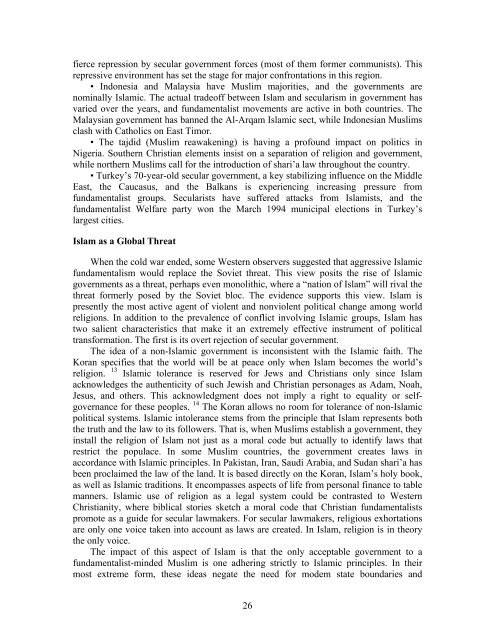Global Security Concerns - Project Gutenberg Consortia Center
Global Security Concerns - Project Gutenberg Consortia Center
Global Security Concerns - Project Gutenberg Consortia Center
You also want an ePaper? Increase the reach of your titles
YUMPU automatically turns print PDFs into web optimized ePapers that Google loves.
fierce repression by secular government forces (most of them former communists). This<br />
repressive environment has set the stage for major confrontations in this region.<br />
• Indonesia and Malaysia have Muslim majorities, and the governments are<br />
nominally Islamic. The actual tradeoff between Islam and secularism in government has<br />
varied over the years, and fundamentalist movements are active in both countries. The<br />
Malaysian government has banned the Al-Arqam Islamic sect, while Indonesian Muslims<br />
clash with Catholics on East Timor.<br />
• The tajdid (Muslim reawakening) is having a profound impact on politics in<br />
Nigeria. Southern Christian elements insist on a separation of religion and government,<br />
while northern Muslims call for the introduction of shari’a law throughout the country.<br />
• Turkey’s 70-year-old secular government, a key stabilizing influence on the Middle<br />
East, the Caucasus, and the Balkans is experiencing increasing pressure from<br />
fundamentalist groups. Secularists have suffered attacks from Islamists, and the<br />
fundamentalist Welfare party won the March 1994 municipal elections in Turkey’s<br />
largest cities.<br />
Islam as a <strong>Global</strong> Threat<br />
When the cold war ended, some Western observers suggested that aggressive Islamic<br />
fundamentalism would replace the Soviet threat. This view posits the rise of Islamic<br />
governments as a threat, perhaps even monolithic, where a “nation of Islam” will rival the<br />
threat formerly posed by the Soviet bloc. The evidence supports this view. Islam is<br />
presently the most active agent of violent and nonviolent political change among world<br />
religions. In addition to the prevalence of conflict involving Islamic groups, Islam has<br />
two salient characteristics that make it an extremely effective instrument of political<br />
transformation. The first is its overt rejection of secular government.<br />
The idea of a non-Islamic government is inconsistent with the Islamic faith. The<br />
Koran specifies that the world will be at peace only when Islam becomes the world’s<br />
religion. 13 Islamic tolerance is reserved for Jews and Christians only since Islam<br />
acknowledges the authenticity of such Jewish and Christian personages as Adam, Noah,<br />
Jesus, and others. This acknowledgment does not imply a right to equality or selfgovernance<br />
for these peoples. 14 The Koran allows no room for tolerance of non-Islamic<br />
political systems. Islamic intolerance stems from the principle that Islam represents both<br />
the truth and the law to its followers. That is, when Muslims establish a government, they<br />
install the religion of Islam not just as a moral code but actually to identify laws that<br />
restrict the populace. In some Muslim countries, the government creates laws in<br />
accordance with Islamic principles. In Pakistan, Iran, Saudi Arabia, and Sudan shari’a has<br />
been proclaimed the law of the land. It is based directly on the Koran, Islam’s holy book,<br />
as well as Islamic traditions. It encompasses aspects of life from personal finance to table<br />
manners. Islamic use of religion as a legal system could be contrasted to Western<br />
Christianity, where biblical stories sketch a moral code that Christian fundamentalists<br />
promote as a guide for secular lawmakers. For secular lawmakers, religious exhortations<br />
are only one voice taken into account as laws are created. In Islam, religion is in theory<br />
the only voice.<br />
The impact of this aspect of Islam is that the only acceptable government to a<br />
fundamentalist-minded Muslim is one adhering strictly to Islamic principles. In their<br />
most extreme form, these ideas negate the need for modem state boundaries and<br />
26






